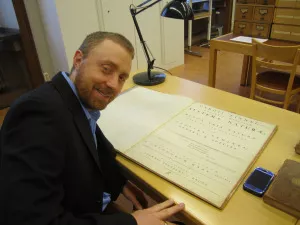
U of T Mississauga Receives over $3.2 in NSERC Grant Funding
Professor Marc Johnson is one of 20 faculty members at UTM to have received NSERC funding and it will go a long way to support his research on the process of plant defences against herbivores within the Department of Biology.
“The NSERC funds will help us to establish a better, more comprehensive understanding of the biology of plant-herbivore interactions,” says Johnson.
On top of the five year $325,000 Discovery Grant he received, Johnson was awarded the Discovery Accelerator Supplement that will provide him with an additional $120K over three years. Johnson says the funds will support the training of personnel in his lab, ranging from undergraduate, graduate students and postdoctoral fellows. The funding will also be used for fieldwork at particular sites related to the research, as well as for material and equipment essential for the work to be undertaken, including the use of greenhouse and growth-chamber facilities.
Johnson’s research, which is run out of the EvoEco Lab at UTM, explores a range of questions from genetics, chemistry, community ecology and evolution mainly in relation to plants and plant-animal interactions. His lab focuses on understanding ecological interactions between plants and animals and how these systems drive the evolution of these organisms, but also in turn how evolution influences the ecological patterns and processes within complex communities.
“My long-term goal is to develop a mechanistic understanding of antiherbivore defences, and to determine how these defences evolve within and among species,” says Johnson.
"Projects that we will be working on with this grant include trying to understand how crops and wild plants protect themselves against herbivores and pathogens, and examining whether plants can adapt to anthropogenic disturbance such as urbanization."
Along with Johnson and his project “Mechanisms and Evolution of Plant Defence Against Herbivores,” the full list of UTM researchers awarded Discovery Grants include the following recipients:
- Mary Cheng, Biology, Investigating the Compartment-specific Functions of G Protein-Coupled Receptor Kinase 2 in the Central Circadian Clock of Mice
- Ulrich Fekl, Chemical & Physical Sciences, Understanding and Exploiting Transition Metal Complexes with Redox-active Ligands
- Robert Gerlai, Psychology, Associative learning and memory in zebrafish
- Yuhong He, Geography, Quantifying Vegetation Stress from the Leaf to Landscape Scale: Integrating Lab/Field Observations, Radiative Transfer Modelling, and UAV Hyperspectral Imaging System
- Peter Kotanen, Biology, Exchanges of Enemies Between Native and Non-native Plants
- Joel Levine, Biology, Social Structure in Drosophilids
- Tina Malti, Psychology, Affective Processing of Moral Events: A Developmental Approach
- Loren Martin, Psychology, The Neural Mechanisms by Which Stress Prevents Empathy in Mice
- Ashley Monks, Psychology, Testosterone Action in the Sexual Differentiation of the Mammalian Nervous System and Behaviour
- Cosmin Munteanu, Institute of Communication, Culture, Information and Technology, Multimodal Natural Assistive Interfaces to Support Reading, Learning, and Access to Critical Information
- Rob Ness, Biology, How Recombination Alters Drift and Selection in the Genome
- Esteban Parra, Anthropology, Identifying the genetic architecture of pigmentary traits in populations of diverse ancestry
- Trevor Porter, Geography, Geochemical Records of Paleoenvironmental Change in Northwest North America from Fossil Plant Waxes, Volcanic Glass and Tree-rings
- Adriano Senatore, Biology, Evolution and Diversity of Synaptic Transmission: Roles for Voltage-gated Calcium Channels and PDZ-domain Mediated Scaffolding
- Steven Short, Biology, Host-virus Dynamics of a Novel Algal Virus System
- Sasa Stefanovic, Biology, Comparative and functional genomics of non-photosynthetic plants
- Doug VanderLaan, Psychology, Testing Biological Theories of Same-Sex Sexual Attraction and Transgender Identity: Somatic, Cognitive, Behavioural, and Demographic Markers
- William Weiss, Mathematical and Computational Sciences, Set-theoretic Structure of Compact Topological Spaces
- Daniel Wigdor, Mathematical and Computational Sciences, Enabling a Symphony of Devices
In total, through the discovery research programs NSERC is funding over 4,000 awards, and researchers across Canada will receive a boost of over $465 million. The programs include funds for scholarships, fellowships, research supplements, and equipment grants. For the full list of recipients, please see NSERC’s website.
